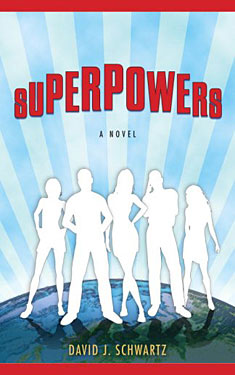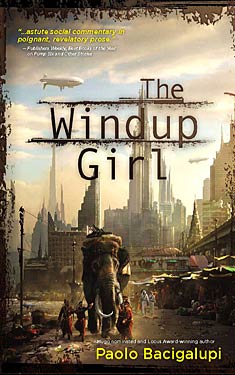Review: The Time Traveler’s Handbook, by Wyllie, Acton, and Goldblatt
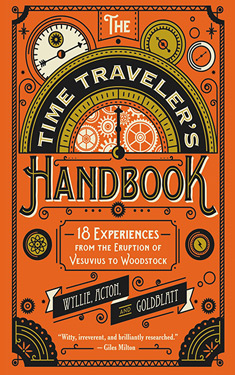 The Time Traveler’s Handbook (Harper Design 2016), researched and written by James Wyllie, Johnny Acton, and David Goldblatt, bills itself as a guide book for a tourism company that sends people back in time to any of 18 different moments in history, so that one may witness the moment for themselves. Why travel to see the ruins of Pompeii, when you can travel to 79 AD in order to watch the very event that has made that city famous in history?
The Time Traveler’s Handbook (Harper Design 2016), researched and written by James Wyllie, Johnny Acton, and David Goldblatt, bills itself as a guide book for a tourism company that sends people back in time to any of 18 different moments in history, so that one may witness the moment for themselves. Why travel to see the ruins of Pompeii, when you can travel to 79 AD in order to watch the very event that has made that city famous in history?
The concept is a good one, but when I started the novel, which begins with a historic meeting of King Henry VIII of England and King Francis I of France, I soon learned the true purpose of the book. The three authors have taken 18 moments in time, meticulously researched them to near infinite detail, and presented them here, in the guise of fiction. At first, I was almost insulted. Why not just write this as a history book, and show us these wonderfully crafted and well-researched moments? Why use time travel as a kid’s spoon shaped like an airplane, making landing noises as you have us eat carrots by pretending our mouths are the hanger? The descriptions of the tent cities and ceremonies of the two kings was very well done, but I was annoyed that the authors thought I needed this device, even as I realized that I did indeed only pick up the book because of the time travel angle.
And then the next chapter came, the 1904 St. Louis World’s Fair, and I was hooked. I grudgingly admitted that I needed to occasionally be spoon fed things like this, and I ate it up! The description of the World’s Fair really captured me. One of the most fascinating to me was the Boer War Exhibit, which had 600 actors to reenact battles from the Anglo-South African War, many of whom were veterans of that war from both sides! Anthropological areas like the Philippines Village, which had the U.S. Department of War assemble 1,200 Filipinos to mimic their everyday life in a sort of reservation. Replicas of sections of several foreign cities or monuments, such as the Wailing Wall, or the Dome of the Rock, with each one populated by real Muslims, Jews, etc. The exhibits and displays went on and on, all incredible in different ways. Imagine how an exhibit featuring a working slaughterhouse would go over now, as children file through to watch animals killed and butchered. I found myself marveling at what the sheer size of the fair must have been, and how I’d never seen anything quite like it in my lifetime.
From then on, they had me, and I thoroughly enjoyed the book. Some chapters were naturally more interesting than others, more a sign of being parallel with my interests, and not a reflection that the other sections were in any way weak or inferior. I found myself not as involved with Opening Night at Shakespeare’s Globe, and then they would have me eating up every written detail the next chapter for the Golden Age of Hollywood.
One small issue with the entire concept is that since it is billed as a tour guide of sorts, there is no narrative. The book merely ends, with no sort of wrap up, conclusion, or summary. There is no hero to celebrate, no enemy to see vanquished. It finishes its description of your journey to see the First Battle of Bull Run in 1861, and then it ends. That’s fine really, it had no plot to wrap up. It just felt a bit… abrupt.
Still, it is an incredibly thorough book, with plenty of details to immerse in the selected time periods, always being sure to address clothes, food and drink, methods of travel, lingo or slang of the time, and then throwing in things like where and when you will arrive and depart to these locations. They helpfully include dos and don’ts at each step, so as to give you the best bang for your buck (and also, so as to avoid accidentally altering the past).
I highly recommend the book.
The Android’s Dream: A Review
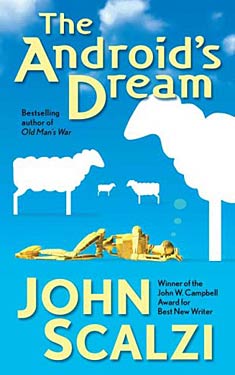 John Scalzi has become an author that I look forward to reading in the last few years. Up to this point, I’ve only read his Old Man’s War series of novels, starting with Old Man’s War, so The Android’s Dream was my first foray into his unrelated novels.
John Scalzi has become an author that I look forward to reading in the last few years. Up to this point, I’ve only read his Old Man’s War series of novels, starting with Old Man’s War, so The Android’s Dream was my first foray into his unrelated novels.
The title refers to a genetically modified and very rare breed of sheep with electric-blue wool. This particular breed is needed for a coronation ceremony on the planet Nidu. Harry Creek, war hero and diplomat who specializes in delivering bad news to the various sentient species living here on Earth, has been tasked by his government to find an Android’s Dream sheep before it’s too late for the ceremony, which could throw Earth into war with the Nidu, whose alliance is essential yet tenuous. His search takes him to a mall pet shop specializing in genetically unmodified pets, and a meeting with the shop’s owner, Robin Baker. But Harry’s not the only person trying to find the rare sheep, including many who wish for the ceremony to fail.
The book is very fast paced, jumping from point of view to point of view, watching events unfold from different angles. The view point of some of the aliens is interesting, as Scalzi tries to show things from their non-human perspective. He pulls this off with modest success, as the view points are different, but in a Star Trek kind of way. There are the back-stabbers, the warriors, the strategists, etc., in other words, different angles of the human condition. This is not a negative, I’m merely pointing out that the view from an alien has been done better before, as with Michael Valentine Smith in Heinlein’s Stranger in a Strange Land, or the visiting alien in the John Carpenter movie Starman. This brings up a good subject. Best alien point-of-view novels and movies?
Harry Creek is an interesting character with some depth, and he helps keep you the reader invested in the story, and its outcome. He’s a man with a history that comes out a little at a time, and Scalzi writes him to be modest and noble, even in compromising situations. You root for him as he tries to keep one step ahead of those that wish him and Earth harm.
This was a fun story, and I liked it enough that I’m now placing other novels from John Scalzi on my reading list, such as Agent to the Stars.
I recommend The Android’s Dream very highly, and will give it a 9 out of 10 for its quick-paced adventure.
Superpowers: A Review
It is the summer break of 2001, and five college kids wake up after a party one morning to find two things have happened: 1) They’re all sporting a good hangover, and 2) they all have superpowers. Not that they know this right away, of course, and that’s part of what makes the first third of the book exciting. This is Superpowers, by David J. Schwartz, and the novel gets right to it, setting a pace that even the character Jack might have trouble keeping up with. The beginning of the book reminded me of the first season of NBCs Heroes, when it was easy to get swept up in the emotions as people discovered the extent of their powers, and also decided what to do with them.
One of the refreshing things about the novel is the different approach to a subject which has been capitalized on so much lately in literature, movies, and the aforementioned TV shows. There are no real super villains. There is no criminal mastermind for the newly formed group to do battle with. There are only their own issues in having telekinesis or super speed in the real world, and in the end, that may be more difficult to fight than if there had been a Dr. Doom or Lex Luthor. At least then, you would have someone to focus your newly formed powers against.
The book moves quickly, and if you get engrossed enough, it may seem like you’re on page 100 in no time, without a lot of showy plot development. In this case, this is ultimately a good thing, as I breezed right through the book, having felt like I watched a good movie, or enjoyed some decent music. There was no challenge of the mind, but it was fun. It was like the novel equivalent of a summer popcorn movie, with just enough at the end to keep you pondering it in a way that summer blockbusters don’t.
I give it an 8 out of 10.
The Windup Girl
The Windup Girl was a difficult novel to read. Not because it took place in the future, with all kinds of futuristic stuff to describe, and futuristic lingo that you have to learn. It’s the past that made this a tough nut to crack for me. Specifically, Thailand’s past
This novel, taking place in a vague future that could be a thousand years from now, or twenty years away, takes place in the city of Bangkok, or what used to be Bangkok, I’m not sure. The novel goes right into the story, and doesn’t belittle the reader with a “catch up,” but rather gets right into it, assuming that you’ll get the hang of it as you go along. Normally, I like when this is done, such as in A Clockwork Orange, when you are just expected to pick up the local slang in which the novel is written. It allows the reader to be completely immersed into the world that the author has created, making it that much more vivid
In this case of The Windup Girl, Bacigalupi is attempting to immerse the reader into the Thai culture, which in many ways, is more foreign than the frightening future England that Burgess painted in the aforementioned dystopian novel. Many of the pro-words are Thai or Cantonese, and the novel constantly refers back to the past of Thailand, expecting the reader to have a grasp of the history, their gods, their profits, and many, many other references that I had no clue about, making it very difficult to follow the story, since much of the tensions were based on the history of the country.
Now, much of it was based on false history. That is, the history in-between our present day, and the unnamed time in which Bacigalupi’s world takes place. But I gathered that much of it was even further back, into our shared (ours and the novel’s) history, and with no knowledge of the region’s history or culture, I just… didn’t get it.
This is the negative beginnings for me of the book, so now let me give it some praise. Despite the difficult (or at least often incomprehensible) read, I hung in there, and what I got was a good story, with very developed characters, who seemed believable in their motivations and their individual quests. Character development is one of Bacigalupi’s strong suits, here. The Windup Girl herself, while seemingly not the main character, is none-the-less pivotal, and though she seems pathetic and one-dimensional at first, over the course of the story, more and more depth is added until at the end, you have a character worthy of rooting and hoping for.
You want things to work out for many of the characters in the novel, and in the end, you mostly get just that. The ending, which I won’t go into, all clicked together to make it a book worth spending your time on. Should a sequel be written, I hope that it goes further into the Japanese culture only glimpsed in the story. That was the main aspect of the novel that I was interested in, and that’s what I’d like to see more of.
I give The Windup Girl 8 out of 10.
The Forever War
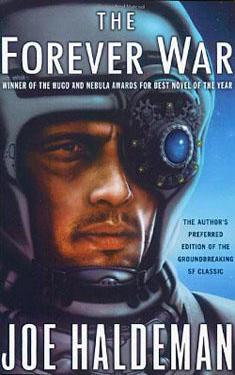 The title is not talking about the war I’m currently fighting here in Afghanistan, but if you thought it was, this is precisely why many people think that The Forever War, by Joe Haldeman, is just as relevant today as when it was written in the mid-1970’s.
The title is not talking about the war I’m currently fighting here in Afghanistan, but if you thought it was, this is precisely why many people think that The Forever War, by Joe Haldeman, is just as relevant today as when it was written in the mid-1970’s.
The Forever War is about a group of citizens drafted into an intergalactic war with aliens that no one has actually seen before. The author wrote the book twenty years in the future, so that the war starts in the 1990’s. Due to relativistic time dilation, going off to fight only two battles before being able to return home sees them return to a world no longer recognized, as something like seven hundred years has passed on Earth. Money no longer exists. The currency is the Calorie, a direct effect of decades of starvation and overpopulation as Earth became a war economy over the last several centuries. Not comfortable on a planet they no longer recognize as home, its off-planet once again for these war veterans, preferring combat in hostile worlds to facing changes at home.
The Forever War is considered a science fiction classic, and indeed, it is well written, and the science of it stands out as top-notch. The way the author fully integrates relativistic effects into the plot, rather than trying to work a cheat around it, as most science fiction does, is worthy of a tip of the hat, and very well painted, visually. However, overall I’m not sure the book lives up to the hype. Its cultural concepts are extremely dated, to the point of being embarrassing in many places. Homosexuality is promoted in Haldeman’s future, as population control, so that these veterans, obviously straight, are seen as the queer ones. This kind of reversal could be interesting, and it helps to further isolate our heroes from society, except that the author handles it a bit clumsily, so that I personally got the impression that despite his trying to sound liberal and tolerant, he himself feared the rise of homosexuality as a norm.
The book is of its time. Haldeman came home from an unpopular war, wherein soldiers like him didn’t go because they wanted to but because the government told them that they had to. How, he thought, can we come home to such hate and disrespect, when we didn’t even volunteer to fight this war? In that, he had a valid point, I suppose, though it might be irrelevant, since soldiers who do volunteer to fight in an unpopular war still shouldn’t then accept being spit on, or called names like “baby killer.” The fact that he had no choice due to the draft was probably just salt on the wound, by his estimation. It was a country – a world – that he no longer recognized. He was obviously very pessimistic about where the country was headed, and his brief tour (most draft tours were 13 months) seemed like it might as well have been centuries. I could see how it would seem like the war made more sense than the home he returned to.
Still, while I would give the novel an overall positive rating, it doesn’t make it by much. The dated concepts and views in the book were often enough to pull me out of the story, or cringe. Indeed, much older science fiction works by Asimov or Heinlein often age better in their concepts than this book does. The saving grace for the novel after all of this is the suddenly upbeat turn at the end, as the author seems to reflect on how one’s world can still be what one makes of it.
I give it 6 out of 10.
This review originally published on Deven’s Science Journal.



















 Full Details
Full Details
